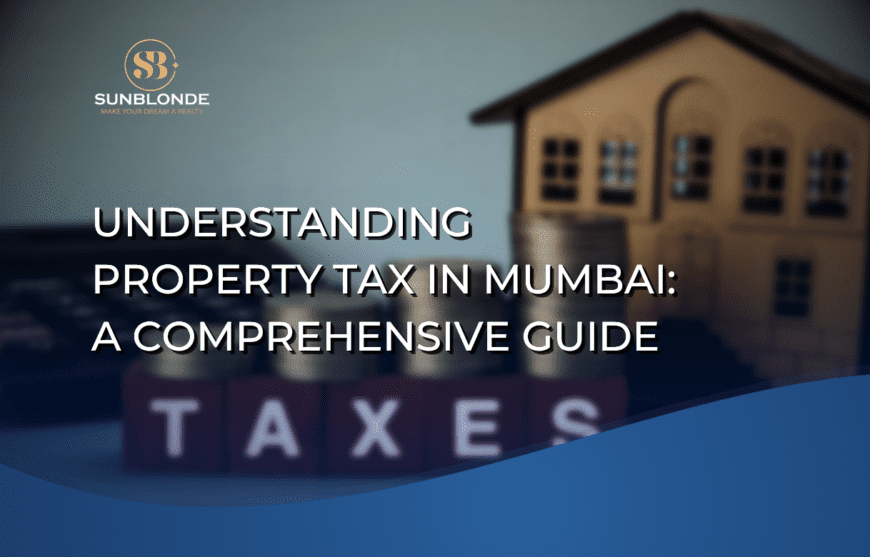Understanding Property Tax in Mumbai: A Comprehensive Guide
Table of Contents
Introduction to Property Tax in Mumbai
Property tax is a levy imposed by the government on real estate properties. It is an essential source of revenue for municipal bodies and local governments, facilitating the provision of public services such as infrastructure development, maintenance of public spaces, and the implementation of welfare programs. In essence, property tax serves as a critical financial backbone for urban development and civic administration.
The importance of property tax cannot be overstated. It ensures that property owners contribute to the upkeep and enhancement of the community in which they reside. Property tax rates and regulations can vary significantly depending on the region, reflecting the diverse economic and developmental needs across different areas.
In India, property tax is governed by various municipal corporations at the state level. Each state has its own framework for assessing and collecting property tax, often involving a mix of valuation methods and tax slabs. Typically, the tax amount is determined based on the property’s annual rental value, market value, or area-based valuation. This comprehensive regulatory structure aims to ensure fairness and efficiency in the tax collection process.
Mumbai, as one of India’s largest and most economically significant cities, has a well-defined property tax system. Administered by the Brihanmumbai Municipal Corporation (BMC), Mumbai’s property tax framework is designed to support the city’s substantial urban infrastructure and public services. Given Mumbai’s unique socio-economic landscape, understanding the specifics of its property tax system is crucial for property owners and potential investors alike.
This blog post aims to provide a comprehensive guide to property tax in Mumbai, exploring its assessment, calculation, payment procedures, and the various exemptions and rebates available. By delving into these aspects, we seek to demystify the complexities surrounding property tax, aiding residents and stakeholders in navigating this essential civic obligation.

Historical Background of Property Tax in Mumbai
Property tax in Mumbai has a long and complex history, intertwined with the city’s growth and development. Originally, property tax was introduced during the British colonial period as a means to generate revenue for urban infrastructure and public services. The first formalized property tax system in Mumbai can be traced back to the Bombay Municipal Corporation Act of 1888, which laid the groundwork for current tax policies.
Over the decades, property tax policies in Mumbai have undergone significant transformations. Post-independence, the Municipal Corporation of Greater Mumbai (MCGM) took over the responsibility of administering property taxes. One of the major changes occurred in the late 1960s when the tax system transitioned from a rental value-based assessment to a capital value-based assessment. This shift aimed to align property tax payments more closely with market values, thereby ensuring a more equitable distribution of tax burdens among property owners.
In the early 2000s, another key milestone was the introduction of the capital value-based property tax system, which replaced the previous rateable value system. This change was brought about to address the disparities in tax assessments and to enhance transparency and efficiency in tax collection. The capital value system calculates tax based on the market value of properties, considering factors such as location, size, and usage, leading to a more accurate reflection of property values.
The impact of these changes on property owners has been significant. While some property owners experienced increased tax liabilities, the overall effect was to create a more balanced and fair taxation system. For the city, these reforms have led to an increase in revenue, which has been crucial in funding urban development projects and improving public services. The evolution of property tax policies in Mumbai highlights the city’s efforts to adapt to changing economic conditions and to ensure a sustainable revenue stream for its growth and development.
How Property Tax is Calculated in Mumbai
The calculation of property tax in Mumbai is a systematic process that involves various factors. The Municipal Corporation of Greater Mumbai (MCGM) employs a well-defined methodology to ensure transparency and fairness in the assessment. Understanding these factors can help property owners navigate their tax liabilities more efficiently.
One of the primary determinants of property tax in Mumbai is the property’s size. The larger the property, the higher the tax amount. The MCGM measures the property’s built-up area, which includes the carpet area plus the thickness of the internal and external walls. This measurement forms the base for further calculations.
Location is another critical factor that influences property tax. Properties situated in prime or well-developed areas attract higher taxes compared to those in less developed or suburban regions. The city’s zoning laws categorize areas into different zones, each with a unique tax rate. These rates are periodically revised to reflect changes in infrastructure and market conditions.
The type of property also plays a significant role in determining the tax amount. Residential properties are taxed differently from commercial properties. For instance, commercial establishments generally incur higher taxes due to the higher potential for revenue generation. Additionally, the usage of the property (e.g., self-occupied vs. rented) can affect the tax rate.
Current tax rates are a product of the Capital Value System (CVS), introduced in 2010 to replace the older Rateable Value System. Under CVS, the tax is calculated based on the market value of the property as assessed by the MCGM. This market value is derived from the Ready Reckoner rates published annually by the state government. These rates reflect the average market value of different types of properties in various locations across Mumbai.
Recent updates in the calculation formula include periodic adjustments to the Ready Reckoner rates and revisions in the zonal classifications. These changes aim to align property tax assessments more closely with current market conditions, ensuring that the tax burden is equitably distributed among property owners.
Payment Process and Deadlines
Paying property tax in Mumbai involves a systematic process designed to provide property owners with multiple convenient methods. The Brihanmumbai Municipal Corporation (BMC) has streamlined this procedure to ensure ease and efficiency.
To begin with, property owners can choose between online and offline payment methods. For online payments, one can visit the official BMC website and navigate to the property tax section. Here, property owners are required to input their property account number and other relevant details. The platform accepts various modes of payment, including net banking, credit cards, and debit cards, making it accessible for tech-savvy residents.
For those who prefer offline methods, payments can be made at designated BMC ward offices. Property owners must carry their property tax bill and can pay via cash, cheque, or demand draft. It is recommended to keep the acknowledgment receipt safe for future reference.

The deadlines for property tax payments in Mumbai typically fall bi-annually, with the first installment due by the end of June and the second by the end of December. Adhering to these deadlines is crucial as late payments incur penalties. The penalty for delayed payments is usually a percentage of the outstanding amount, which can accumulate over time, increasing the financial burden on property owners.
To accommodate diverse financial situations, the BMC also offers installment plans. Property owners who find it challenging to pay the full amount at once can opt for these plans, which allow the tax to be paid in smaller, manageable portions over an extended period. This flexibility ensures that property tax payments are not a substantial immediate financial strain.
Understanding the payment process and adhering to deadlines is vital for property owners in Mumbai. Timely payments not only help in avoiding penalties but also contribute to the efficient functioning of municipal services. By providing both online and offline methods, as well as installment options, the BMC ensures that every property owner can meet their tax obligations conveniently.
Understanding the exemptions and rebates available for property tax in Mumbai can significantly ease the financial burden for eligible property owners. The Brihanmumbai Municipal Corporation (BMC) offers several exemptions and rebates to different categories of property owners, aiming to provide relief and encourage timely tax payments.
One of the primary exemptions is available to properties owned by charitable institutions. These institutions must be registered under the Bombay Public Trusts Act, 1950, and must use the property for the purposes aligned with their charitable activities. Additionally, properties used for religious purposes, such as temples, mosques, and churches, are also exempt from property tax.
Senior citizens, widows, and disabled individuals may be eligible for property tax rebates in Mumbai. For instance, senior citizens owning a self-occupied residential property can apply for a rebate of up to 50%. Widows and disabled individuals can also benefit from similar rebates, provided they meet specific criteria set by the BMC. These criteria generally include ownership of the property and its usage as a primary residence.
The process of applying for these exemptions and rebates typically involves submitting an application to the BMC along with relevant documents that prove eligibility. For example, senior citizens need to provide age proof, while charitable institutions must submit their registration certificates and usage details of the property. It is advisable to check the BMC’s official website or visit the local ward office for detailed application procedures and required documentation.
Recent changes to property tax policies in Mumbai have aimed at increasing transparency and simplifying the application process for exemptions and rebates. The introduction of online portals allows property owners to apply and track the status of their applications more efficiently. These enhancements are part of the BMC’s ongoing efforts to streamline property tax administration and ensure that eligible property owners can easily avail themselves of the benefits they are entitled to.
Understanding and leveraging these exemptions and rebates can make a considerable difference in managing the financial obligations associated with property ownership in Mumbai. Property owners are encouraged to stay informed about the latest policies and avail themselves of the benefits they qualify for to minimize their tax burden.

Challenges and Common Issues Faced by Property Owners
Property owners in Mumbai often encounter a variety of challenges and issues when dealing with property tax. One of the most common challenges is discrepancies in tax assessments. These discrepancies can arise from errors in property valuation, outdated information, or incorrect categorization of the property. Such inaccuracies can result in either overpayment or underpayment, causing financial strain and legal complications for the property owner.
Another significant issue is the complexity and inefficiency of the payment processes. Many property owners find it challenging to navigate the various steps involved in making tax payments, especially when they are required to visit multiple offices or deal with cumbersome online platforms. The lack of a streamlined payment system can lead to delays, missed deadlines, and even penalties for late payments.
Bureaucratic hurdles also pose a considerable challenge. Property owners often have to deal with extensive paperwork, unclear procedures, and unresponsive officials, which can be both time-consuming and frustrating. For those unfamiliar with the bureaucratic processes, this can lead to confusion and missteps, further complicating their tax obligations.
To address these issues, property owners can take several proactive steps. Firstly, it is advisable to regularly verify property details and tax assessments to ensure accuracy. This can be done by consulting with a property tax expert or by visiting the local municipal office. Secondly, property owners should familiarize themselves with the online payment systems available and take advantage of any digital platforms that simplify the process. Additionally, maintaining clear records of all transactions and communications with tax authorities can help in resolving any future disputes.
By being vigilant and proactive, property owners in Mumbai can mitigate many of the challenges associated with property tax, ensuring a smoother and more manageable experience.
The Municipal Corporation of Greater Mumbai (MCGM) plays a pivotal role in the administration and collection of property tax within the city. As the principal governing body responsible for urban management, the MCGM utilizes the revenue generated from property taxes to fund a plethora of public services and infrastructure projects. These encompass essential services such as water supply, sewage systems, waste management, public health, and education. Moreover, a significant portion of the funds is allocated to the maintenance and development of roads, bridges, and public transportation networks, directly contributing to the enhancement of the city’s overall infrastructure.
To ensure the efficient use of property tax revenue, the MCGM has implemented various initiatives aimed at improving transparency and streamlining the tax collection process. One such initiative is the introduction of an online property tax payment system. This platform allows property owners to conveniently pay their taxes, access their tax records, and receive updates on their payment status, thereby reducing the need for in-person visits to MCGM offices and minimizing administrative delays.
Additionally, the MCGM has undertaken measures to educate citizens about their property tax obligations and the benefits of compliance. Through public awareness campaigns and informational sessions, the MCGM seeks to foster a greater understanding of how property taxes contribute to the city’s development and the critical role they play in sustaining municipal services. By doing so, the MCGM aims to enhance voluntary compliance and reduce instances of tax evasion.
Furthermore, the MCGM continuously reviews and updates its property tax assessment methodologies to ensure fairness and accuracy. By incorporating technological advancements and data analytics, the MCGM strives to provide an equitable taxation system that reflects current market values and property conditions. This ongoing commitment to modernization underscores the MCGM’s dedication to creating a more efficient and transparent property tax administration system, ultimately benefiting both the city and its residents.
Future Trends and Developments
The property tax landscape in Mumbai is poised for significant changes in the coming years, driven by both policy shifts and technological advancements. One of the most notable trends is the ongoing digitization of property tax collection and assessment systems. The Brihanmumbai Municipal Corporation (BMC) has been gradually implementing online portals and mobile applications to streamline the tax payment process, making it more efficient and transparent for property owners.
Experts predict that the integration of advanced technologies such as Geographic Information Systems (GIS) and Artificial Intelligence (AI) will play a pivotal role in the future of property tax management. GIS can provide precise mapping and data analytics, enabling more accurate property valuations, while AI can help in predictive analysis and identifying potential tax evasion cases. These technological tools are expected to enhance the efficiency of the tax collection system and reduce discrepancies in property assessments.
Additionally, there are discussions around policy reforms aimed at making the property tax system more equitable and sustainable. One proposed change is the introduction of a uniform tax rate across different zones in Mumbai, which could simplify the tax structure and ensure fair contributions from all property owners. Another potential development is the implementation of incentives for green buildings and sustainable practices, which could encourage property owners to adopt environmentally friendly measures.
The impact of these future trends and developments on property owners in Mumbai could be substantial. For instance, the adoption of digital platforms for tax payments could reduce the time and effort required for compliance, while more accurate property assessments could lead to a fairer distribution of tax burdens. On the other hand, policy changes such as uniform tax rates might result in increased taxes for some property owners, depending on their property’s location and value.
Conclusion of Property tax mumbai, the property tax in mumbai landscape is evolving, with promising advancements and potential policy reforms on the horizon. Property owners should stay informed about these developments to understand how they might affect their tax obligations and take advantage of any benefits arising from the new systems and regulations.
Sunblonde Realtors, We are well know Real Estate Consultant in Mumbai, For real estate projects in all over Mumbai please visit Sunblonde Realty.


Leave a Reply